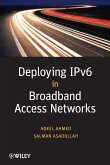With the announcement in 2011 that the current Internet Protocol (IP), IPv4, has nearly run out, interest in IPv6 -- the latest IP version -- has grown substantially. This book describes IPv6 technology and its repercussions on organizations, including strategies and techniques for assessing the impact of deploying IPv6 on a network, discovering current IP assets, assessing network readiness, creating a plan to deploy IPv6 while retaining IPv4 connectivity, and for managing a dual protocol IPv4-IPv6 network. It is a must read for IP network engineers, managers, and those who work in IT.
A guide for understanding, deploying, and managing Internet Protocol version 6
The growth of the Internet has created a need for more addresses than are available with Internet Protocol version 4 (IPv4)-the protocol currently used to direct almost all Internet traffic. Internet Protocol version 6 (IPv6)-the new IP version intended to ultimately succeed IPv4-will expand the addressing capacity of the Internet to support the explosive growth of users and devices on the Internet as well as add flexibility to allocating addresses and efficiency for routing traffic.
IPv6 Deployment and Management describes the IPv6 protocol in detail, as well as technologies for interworking IPv4 and IPv6. It discusses why organizations-even those with adequate IPv4 space-should consider IPv6 deployment from a business perspective. In addition, it details strategies and techniques for assessing the impact of deploying IPv6 on a network, discovering current IP assets, assessing IPv6 readiness, creating a plan to deploy IPv6 while considering addressing security and network management impacts, and managing a dual protocol IPv4-IPv6 network.
Featured chapters in the book are:
IPv6 Deployment Drivers
IPv4-IPv6 Co-Existence Technologies
IPv6 Readiness Assessment
IPv6 Address Planning
IPv6 Security Planning
Managing the Deployment
IPv6 Network Management Planning
Managing the IPv4/IPv6 Netowork
IPv6 and the Future Internet
IPv6 Deployment and Management is a must-read for IP network engineers, managers, and those who work in Information Technology.
Hinweis: Dieser Artikel kann nur an eine deutsche Lieferadresse ausgeliefert werden.
A guide for understanding, deploying, and managing Internet Protocol version 6
The growth of the Internet has created a need for more addresses than are available with Internet Protocol version 4 (IPv4)-the protocol currently used to direct almost all Internet traffic. Internet Protocol version 6 (IPv6)-the new IP version intended to ultimately succeed IPv4-will expand the addressing capacity of the Internet to support the explosive growth of users and devices on the Internet as well as add flexibility to allocating addresses and efficiency for routing traffic.
IPv6 Deployment and Management describes the IPv6 protocol in detail, as well as technologies for interworking IPv4 and IPv6. It discusses why organizations-even those with adequate IPv4 space-should consider IPv6 deployment from a business perspective. In addition, it details strategies and techniques for assessing the impact of deploying IPv6 on a network, discovering current IP assets, assessing IPv6 readiness, creating a plan to deploy IPv6 while considering addressing security and network management impacts, and managing a dual protocol IPv4-IPv6 network.
Featured chapters in the book are:
IPv6 Deployment Drivers
IPv4-IPv6 Co-Existence Technologies
IPv6 Readiness Assessment
IPv6 Address Planning
IPv6 Security Planning
Managing the Deployment
IPv6 Network Management Planning
Managing the IPv4/IPv6 Netowork
IPv6 and the Future Internet
IPv6 Deployment and Management is a must-read for IP network engineers, managers, and those who work in Information Technology.
Hinweis: Dieser Artikel kann nur an eine deutsche Lieferadresse ausgeliefert werden.







